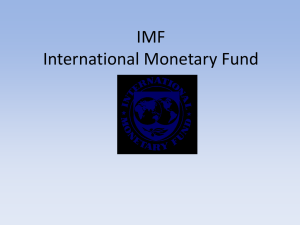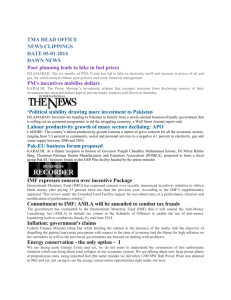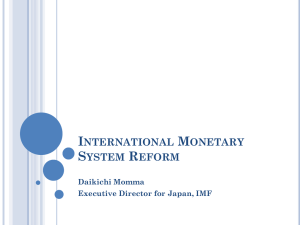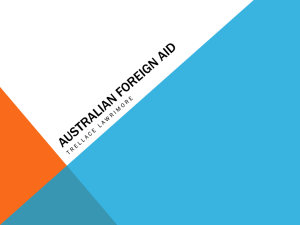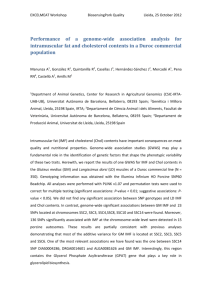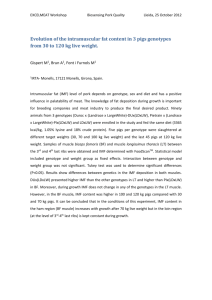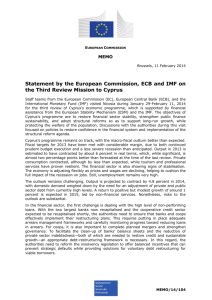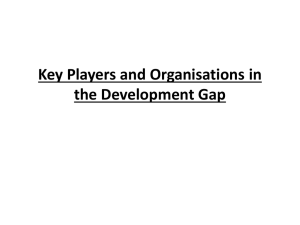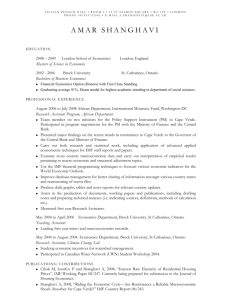Low income countries are facing economic devastation brought
advertisement
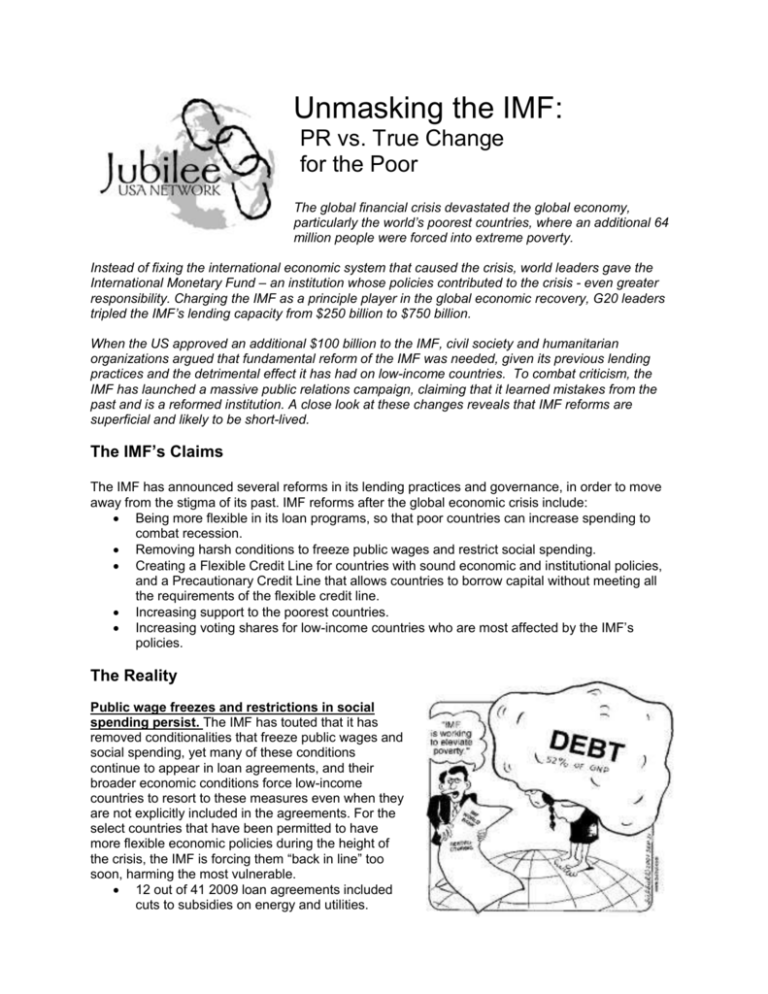
Unmasking the IMF: PR vs. True Change for the Poor The global financial crisis devastated the global economy, particularly the world’s poorest countries, where an additional 64 million people were forced into extreme poverty. Instead of fixing the international economic system that caused the crisis, world leaders gave the International Monetary Fund – an institution whose policies contributed to the crisis - even greater responsibility. Charging the IMF as a principle player in the global economic recovery, G20 leaders tripled the IMF’s lending capacity from $250 billion to $750 billion. When the US approved an additional $100 billion to the IMF, civil society and humanitarian organizations argued that fundamental reform of the IMF was needed, given its previous lending practices and the detrimental effect it has had on low-income countries. To combat criticism, the IMF has launched a massive public relations campaign, claiming that it learned mistakes from the past and is a reformed institution. A close look at these changes reveals that IMF reforms are superficial and likely to be short-lived. The IMF’s Claims The IMF has announced several reforms in its lending practices and governance, in order to move away from the stigma of its past. IMF reforms after the global economic crisis include: Being more flexible in its loan programs, so that poor countries can increase spending to combat recession. Removing harsh conditions to freeze public wages and restrict social spending. Creating a Flexible Credit Line for countries with sound economic and institutional policies, and a Precautionary Credit Line that allows countries to borrow capital without meeting all the requirements of the flexible credit line. Increasing support to the poorest countries. Increasing voting shares for low-income countries who are most affected by the IMF’s policies. The Reality Public wage freezes and restrictions in social spending persist. The IMF has touted that it has removed conditionalities that freeze public wages and social spending, yet many of these conditions continue to appear in loan agreements, and their broader economic conditions force low-income countries to resort to these measures even when they are not explicitly included in the agreements. For the select countries that have been permitted to have more flexible economic policies during the height of the crisis, the IMF is forcing them “back in line” too soon, harming the most vulnerable. 12 out of 41 2009 loan agreements included cuts to subsidies on energy and utilities. In Togo, the IMF objected to attempted increases in minimum wages and subsidies to farmers. In order for Romania to obtain a desperately needed bail out loan, the IMF mandated that wages and pensions be cut by 25% and 15% respectively. Poor countries are not protected from crises by new IMF lending instruments. In the wake of the financial crisis, the IMF has expanded access to capital with their new flexible and precautionary credit lines. The Flexible credit lines, however are only available to countries who pass rigorous qualification criteria such as maintaining low inflation and low deficits. This is the same as requiring conditions, except that countries have to institute the conditions before they qualify. Thus far, only three countries (Mexico, Colombia, and Poland) have qualified for the Flexible Credit Line and the strict qualifications exclude the poorest countries. The Precautionary Credit Line is available to countries that do not meet all of the criteria for the Flexible Credit line, yet this capital probably will not be accessible to the low-income countries either. Increased IMF lending to poor countries has increased their debt burdens. The IMF has dramatically increased its lending to the poorest countries since the crisis ($3.8 billion in 2009 over $1.2 billion in 2008). The IMF has raised billions more than expected through sale of its gold, and yet the Fund has not yet promised any additional resources to low-income countries. More concerning is that, despite acknowledging that the debt sustainability for low-income countries has deteriorated since the crisis, the IMF is adding to these countries’ debt burdens. The Democratic Republic of Congo received $265 million in loans from the IMF in 2009, which will cancel out the benefits of $320 million in debt cancellation that the country is set to receive from the IMF soon. Poor countries still have no meaningful voice or vote in the IMF. The IMF had been criticized for the fact that high-income countries hold the majority of the voting shares and wield the most power within the IMF. Due to pressure, the IMF introduced a new quota formula in 2008 and plans to implement that formula. Unfortunately, even with implementation of these reforms high-income countries still hold the majority of the voting shares and low-income countries voting shares will only increase by a small percentage. This leaves the most vulnerable countries with little to no say when it pertains to IMF policies and practices. How the US Government can Improve IMF Lending Practices and Policies The US government wields significant power and influence over the practices and policies of the IMF. Civil society and humanitarian organizations urge the US government to call on the IMF to promote the following reforms: 1. To work with poor country governments to ensure that countries with IMF programs do not cut back spending in 2010 and 2011, so that these countries can support public investment in human and economic development and the growing climate crisis. 2. Protect public sector wages and subsidies on necessities for the most vulnerable. 3. Use IMF gold reserves to allow for more aid in the forms of grants and not loans so that poor countries do not fall back into unsustainable debt levels. 4. Adopt measures to allow for low-income countries that are most affected by the IMF’s policies to have a meaningful voice within the institution. To read Jubilee USA’s full report “Unmasking the IMF” and get involved, visit www.jubileeusa.org Jubilee USA Network ~ 212 East Capitol Street NE, Washington DC 20003 ~ 202-783-0215 ~ www.jubileeusa.org
